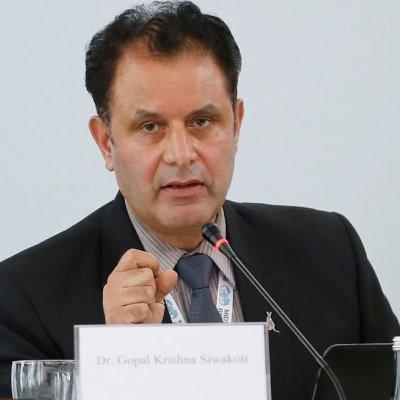
MESSAGE FROM PRESIDENT
Sixty-seven years have elapsed since the Universal Declaration of Human Rights (UDHR) was adopted by the UN. It was also the first time that human rights and fundamental freedoms were set forth in such detail. Inspired by 55 different state constitutions, the UDHR is a compromise among many different conceptions of humanity. It represented a world milestone in the long struggle for human rights and remains one of the best known and most often cited human rights documents in the world to uphold the notion of “All Human Rights for All"—embracing universality, indivisibility and interdependence of all human rights. Today, more than 60 human rights instruments constitute an international standard of human rights derived from UDHR. It is a time for governments to ensure that the rights set forth in the international instruments are reflected in their national legislation and to move to ratify those international human rights treaties that may be still pending. The farewell to 67th Anniversary of UDHR also provides the opportunity for more countries not only to condemn blatant violations of human rights but also to take responsibility and action to break the cycle of impunity whenever human rights are violated. Over the years, the UN has created conventional and extra-conventional mechanisms in order to monitor compliance of States parties with various human rights instruments and to investigate allegations of human rights abuses. There has been a major shift in the human rights doctrine and protection mechanism in the recent years. Forced migration, peace and transitional justice, disaster management have formed significant components of post-2015 Sustainable Development Goals that have overwhelmingly dominated global human rights agenda. Human rights are not simply a bundle of western concepts imposed on the countries of the South but are beyond the so-called parachute dropping of human rights into these countries. Poverty, war, civil strife, nuclear proliferation, arms build-up and other anti-people policies have jeopardized the effective realization of all human rights for all and attaining them is still a distant reality. Majority of the population in the global south is deprived of its fundamental freedoms along with economic, social and cultural rights resulting malnutrition, infant mortality, homelessness, discrimination, and injustices. While people starve to death in some places, the warehouses in other privileged cities have more than enough food. The great majority of people in the global south are poor because of the inequitable ownership and control of the means of production, capital, technology, land and other productive assets. There is an urgent need to fundamentally restructure economic relations based on the principles of equality, cooperation, and mutual benefit and along the lines set forth in various documents of domestic and international law. Our own country Nepal, which has passed through high intensity armed conflict for more than a decade, deadly earthquake, post-conflict organized crimes and violence, broad human rights movements are gaining strength to collectively achieve the rights as enshrined in the new constitution which paves a way for the effective realization of inclusive human rights, broader freedom and democratization. Nonetheless, the transitional justice process is not gaining any substantial mileage with victims/survivors still waiting for justice of the past abuses. Securing greater gender equality, total elimination of caste-based discrimination and untouchability, ensuring safer migration and robust action on counter-human trafficking as well as protection of refugees are other issues of critical concern among others. INHURED International, as a front-runner civil society organization having Special Consultative Status with ECOSOC of the UN, is dedicated to the protection and promotion of human rights beyond border to build an efficient, human rights-friendly democratic culture in the society and within the machinery of government; one which respects human rights and is accountable to culture of peace and justice in society at large. For this, greater debate on the unconditional fulfillment of human rights obligations with no room for violence and impunity is the demand of the day.
INHURED Vision 50 and beyond
INHURED International is a front-runner human rights organization with Special Consultative Status with ECOSOC of the United Nations. As the name suggests, the organization, with the passage of time, has expanded to one of the leading organizations in terms of spearheading uncompromising safeguards for human rights and rule of law, protection sensitive migration management, refugee response, human security, access to justice and disaster response. Research, education, training, policy advocacy, lobbying and networking at local, national and international levels for the cause of safeguarding human rights are the organization’s key programming approaches.
Remaining within the centre of credo of community resilience through bottom-up approach, INHURED has been working with the economically challenged and disadvantaged rural communities for the past nearly three decades focused on human rights of disadvantaged, deprived and displaced. During this period, based on the five-fold approach of human rights, democracy, peace and justice and migration management, it has successfully implemented numerous programmes and projects to address the crucial problems of the country and people for far-reaching reform in these disciplines. These include human rights-based civic education; gender equality and social inclusion; empowerment of women, children and other vulnerable communities; transitional justice, safe, humane, orderly and regular migration; and disaster displacement.
Of late, in considering the escalating plights of conflict and disaster-affected Nepalese people resulting from the continued perpetual poverty, illiteracy, exclusion, dearth in disaster preparedness, discriminatory practices and deficit in culture of tolerance, INHURED has been focusing its programming in the conflict and disaster sectors, including COVID19 like pandemic. It has been pursuing an approach of ‘conflict and disaster sensitive rights-based development’ with the intention of creating an enabling environment for informed inclusion of affected population also by ensuring environmentally friendly and socially responsive development with a focus target to alleviate the vicious cycle of discrimination and marginalization the traditionally excluded and vulnerable communities.
Vision-50 and Beyond
Background
The world is currently facing with multiple adversarial concerns around human rights, transitional justice, gender equality and social inclusion, disasters, displacement, forced migration and human trafficking and there is no coherent national vision to effectively address such an confrontational scenario. While the constitution covers all of the issues within its safeguards radar, very little reforms has been witnessed so far. Proactive and inclusive engagement of all actors of the society through dialogues and action is the demand of the day to bring long-cherished change. In light of this, INHURED International is setting out its “VIsion-50 and Beyond” to galvanize multi-‐stakeholder collaboration for effective realization of the issues of critical concern as mentioned above. This Vision, the culmination of extensive in-house and out-house consultations, will be accompanied by a Plan of Action which sets out what we need to do in order for the Vision to be realized by identification of challenges, opportunities and good practices towards building a society fit for everyone to live !
Preamble
Respecting the international legal framework that exists to protect the human rights of all individuals and to offer specific protections for refugees, torture survivors and complainants, trafficked persons, IDPs, stateless persons, children, women and dalits, indigenous people, people with disability and the marginalized in particular; INHURED upholds the 1951 Convention relating to the Status of Refugees and its 1967 Protocol (the Refugee Convention), the 1954 Convention relating to the Status of Stateless Persons and the 1961 Convention on the Reduction of Statelessness (the Statelessness Conventions), the 1984 Convention against Torture and Other Cruel, Inhuman or Degrading Treatment or Punishment (CAT), the Convention Against Transnational Organized Crime’s 2000 Protocol to Prevent, Suppress and Punish Trafficking in Persons, Especially Women and Children (the Trafficking Protocol), the 1989 Convention on the Rights of the Child (CRC), the 1979 Convention on the Elimination of all forms of Discrimination Against Women (CEDAW), and the 2006 Convention on the Rights of Persons with Disabilities (CRPD); the principles of non-‐refoulement, non-‐discrimination and the prohibition on torture as customary international law; the human rights of all individuals as set out in the Universal Declaration of Human Rights (UDHR) and all other relevant treaties; and the 1998 Guiding Principles on Internal Displacement, which are based on international law; and therefore reaffirming INHURED’s commitment to take a rights-‐based approach, to act in accordance with humanitarian principles, to uphold the highest standards of individual and organisational conduct, and to ensure quality, accountability and effectiveness in our work.
Vision Statement
INHURED envisions a novel world in which all victims and survivors of human rights violations, including refugees, asylum seekers, and complainants, trafficked persons, IDPs, stateless persons and returnees and all other people in need of protection have equal and adequate access to assistance and protection, and to timely durable solutions as relevant. We envision a novel world in which the government, civil society and other actors collaborate effectively towards a common purpose of upholding the internationally accepted human rights norms and values, with respect for their differentiated roles and responsibilities.
Objectives
· To advance ‘all human rights for all’ at the national, regional and international levels through research and advocacy.
· To ensure national and local ownership of international human rights protection mechanisms with harmonized national framework that is consistent with international standards based on the well-researched realities and needs at national context.
· To work with local initiatives by civil society actors and encourages the formation of inclusive local networks across the communities.
· To create and widen space for advocacy with local and national bodies responsible for human rights protection and promotion in all civil, political, economic, social and cultural fronts.
· To coordinate and convene trainings and workshops targeted at strengthening the capacity of concerned stakeholders to respond to key human rights protection challenges more effectively (legal aid, advocacy, refugee law, forced migration, counter-trafficking, disaster response, GESI, transitional justice and overall community resilience drive) so that the target population will be self-sustained to claim, exercise and enjoy their rights.
· To cater its wealth of time-tested experience and expertise that will be shared throughout the community. Accordingly, our capacity strengthening initiatives will empower local civil society organizations and surveillance groups in the long-run by putting them in a better position to work as genuine catalysts towards claiming rights and rendering responsibilities even in the absence of human rights defenders and legal practitioners.
· To build and strengthen informed citizenry on human rights and justice in general and, migration, counter-trafficking, disaster response, climate change, refugees and gender in particular through civic education by enhancing improved knowledge sharing activities in the forms of production of various tailor-made knowledge products and dissemination channels so that the community becomes adequately informed, empowered and resilience in the direction of understanding from local to national to global dynamics impacting them.
· To conduct outreach and awareness-raising campaign with the aim of increasing our actions’ visibility and impacts by highlighting human rights concerns and fighting against growing incidences of marginalization, poverty and deprivation compounded with unsafe and forced migration with a giant impact on agro-products, health, education and energy.
· To collaborate with homogeneous as well as heterogeneous groups and promote optimal synergy between collaborators/partners irrespective of size, coverage, power and resources by making mutual reverence of each other's mandates, obligations and independence and also by ensuring mutual recognition of each other's constraints and commitments.
· To foster the existing networking in the area of post-disaster community resilience, GESI and transitional justice for sharing information, ideas and support through the effective use of information, research and evidence.
· To share and exchange information to taking joint action through the development of an equitable collaboration among resource partners, project collaborators, community institutions, academic partners and local surveillance groups/partners to combine knowledge and resources to advance rights-based societal transformation.
FOUR PILLAR COMPONENTS
1. Freedom from Violence, Coercion, Deprivation, Exploitation and Abuse
We envision a novel world in which:
· All persons enjoy their full civil and political rights in accordance with international human rights law. The principle of non-‐discrimination is respected in all contexts such that everyone is entitled to rights and freedoms, without distinction of any kind, including distinction based on gender, age, race, disability, health status, sexual orientation, family status, ethnic background, nationality, language, political opinion or affiliation, religion, culture, social status or indigence. All persons have equal access to protection and assistance without stigmatisation, including highly vulnerable people such as victims of human trafficking, the elderly, people living with HIV/AIDs, people of differing sexual orientation and gender identities and minority ethnic, linguistic and religious groups.
· All persons are physically safe from violence and enjoy adequate protection to that end. In particular, sex and gender-‐based violence (SGBV) is prevented and addressed, enabling effective remedies for survivors.
· Gender equality exists such that the rights of women and girls are respected, protected and fulfilled in spirit and in law, and the agency and capabilities of women and girls are recognised.
· All children enjoy their full range of rights under the CRC. To this end, child protection measures exist which uphold the best interest principle, and which include dedicated and appropriate child-‐ friendly procedures and support services for children, whether separated, unaccompanied or accompanied.
2. Access to Essential Services and Livelihoods
We envision a novel world in which:
· All persons enjoy their economic, social and cultural rights in accordance with international human rights law and the constitutional provision.
· All persons enjoy the right to the highest attainable standard of health, enjoying access to timely, acceptable and affordable healthcare, including preventive care and mental health services.
· All persons enjoy the right to employment and a sustainable livelihood (including access to lawful employment and social security), enabling them to enjoy independence, self-‐reliance, and to be active members of society.
· All persons enjoy the right to education, with safe and relevant learning opportunities made accessible to all learners, regardless of their gender or abilities.
· All persons have safe and adequate access to food, water, sanitation, nutrition, shelter and clothing, provided in a way that promotes human dignity.
3. Legal Protection and Services
We envision a novel world in which:
· All persons enjoy equality before the law and have timely access to justice and effective remedies for human rights violations.
· Countries signed, ratified and implemented the Refugee Convention, Migration Convention, the Statelessness Conventions, Optional Protocol to CAT and the Trafficking Protocol, Rome Statute on International Criminal Court, and have extended application of these instruments at domestic context.
· All asylum seekers have safe, timely, and orderly access to reception and registration procedures, with consideration given to the needs of populations who are in camps, detention centres and urban areas.
· Border, security, and immigration authorities understand and comply with the obligation to receive asylum seekers, including measures to ensure that there is due process of law, access to information, effective and competent interpretation and translation services, a right to legal advice and legal representation, impartial decision-‐making, and access to UNHCR and civil society representatives.
· No one in need of protection is penalized because of the way they enter a country, whether with or without prior permission.
4. The Highest Possible Level of Self-Sufficiency
We envision a novel world in which:
· People in need of protection, including disaster victims and survivors, actively participate in all decisions affecting their lives, have access to accurate and up to date information about actions taken on their behalf, and explicit efforts are made to listen to, consult and engage affected communities in order to ensure continuous improvement in existing programs and ensure ongoing accountability to them.
· On the principle of “nothing about us without us”, people in need of protection are free to organise, advocate and support each other in accessing and enjoying their rights, and are supported to identify and establish supportive networks, community self-help, and local surveillance groups.
· All actors recognise, and where possible support, the efforts of people in need of protection to attain self-sufficiency, and reduce the magnitude of dependency so as to ensure local ownership of sustainable livelihood and pro-people development.
OUR ACTION
Four-Pillar Approach
1. Research and Advocacy:
Through advocacy, INHURED aims to advance all human rights for all at the national, regional and international levels. Our goal is national and local ownership of international human rights protection mechanisms with harmonized national framework that is consistent with international standards based on the well=reached realities and needs at national context.
Under this pillar, INHURED will strive to work with local civil society actors and encourages the formation of inclusive local networks across the communities. Through this pillar, we aim to create space for advocacy with local and national bodies responsible for human rights protection and promotion in all civil, political, economic, social and cultural fronts. To coordinate, plan and evaluate these advocacy strategies, INHURED holds national, regional and local level consultations, roundtables, and workshops throughout the year.
2. Capacity Strengthening:
INHURED will coordinate and convene trainings and workshops targeted at strengthening the capacity of concerned stakeholders to respond to key human rights protection challenges more effectively (legal aid, advocacy, refugee law, forced migration, counter-trafficking, disaster response, GESI, transitional justice and overall community resilience drive).
Under this pillar, the INHURED has a wealth of experience and expertise that is shared throughout the community and our capacity strengthening initiatives empowers local civil society organizations and surveillance groups and puts them in a better position to work as catalysts towards claiming rights and rendering responsibilities.
3. Knowledge Products and Outreach:
INHURED aims to build and strengthen informed citizenry on human rights and justice in general and, migration, counter-trafficking, disaster response, climate change, refugees and gender in particular through civic education by enhancing improved knowledge sharing activities in the forms of production of various tailor-made IEC materials and dissemination channels.
Under this pillar, outreach and awareness-raising will be conducted with the aim of increasing INHURED’s visibility, highlighting human rights concerns and fighting against growing incidences of forced migration and impunity thereof. Through INHURED’s archiving and research initiative, the organization will be in a strong position to conduct advocacy activities based on the needs of the community for locally owned transformation drive.
4. Partnerships for a Supportive Operating Environment
INHURED will continue collaboration with like-minded organizations and promote mutual respect between collaborators/partners irrespective of size, coverage, power and resources by making mutual reverence of each other's mandates, obligations and independence and also by ensuring mutual recognition of each other's constraints and commitments. The existing networking in the area of post-disaster community resilience, GESI and transitional justice will be further fostered for sharing information, ideas and support through the effective use of information and research.
Under this pillar, INHURED will continue to share and exchange information to taking joint action through the development of an equitable collaboration among resource partners, project collaborators, community institutions/academic partners and local surveillance groups to combine knowledge and resources to advance rights-based societal transformation. This will be founded on reiteration of mutual respect and appreciation, allowing each party equal stake, responsibility and benefit.

How We Work

Institutional Policies

Legal Statues & Structure

Institutional Organization

Vision Mission & Goal

Message From President


